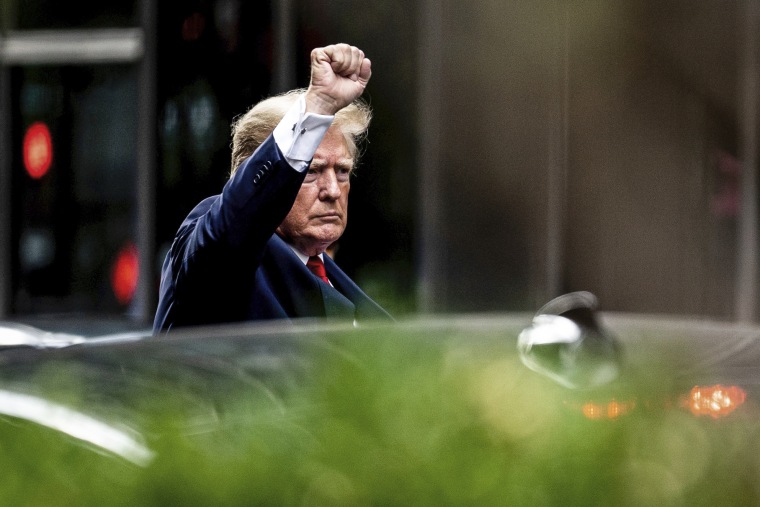Former President Donald Trump is all but certain to run for president again. And he’s sending increasingly clear signals that he’d like to form another Jan. 6-style mob to help him secure the White House.
In a Thursday interview with right-wing radio host Wendy Bell, Trump alleged that he’s now offering a growing suite of services for Jan. 6 defendants: financial support, and — if he makes it back into the White House — pardons and formal government apologies.
“I am financially supporting people that are incredible and they were in my office actually two days ago, so they’re very much in my mind,” Trump said during the interview. “It’s a disgrace what they’ve done to them.” He also claimed that “if I win, I will be looking very, very strongly about pardons, full pardons.” That could mean trying to spring Jan. 6 rioters who are in prison if he were to become president.
It could be argued Trump is effectively setting the stage for a kind of pro-Trump paramilitary force.
Is Trump actually financially supporting Jan. 6 defendants? There’s good reason to be skeptical. As The Washington Post notes, Trump won’t even help pay the legal fees of his blindly loyal attack dog, Rudy Giuliani. And before scamming people as president, Trump scammed people who put their trust in him to teach them about real estate or to oversee funds for charity.
Less important than his follow-through, however, is the fact that Trump is sending out a signal — one which his most devoted supporters will surely take note of. Trump is not only continuing to defend the transgressions of Jan. 6, but also intensifying his commitment to take care of its perpetrators should he achieve presidential power again. Implicit in these pledges is another one: that he will look to take care of anyone who helps him next time around.
Again, the improbability of him following through on some of his claims is beside the point. Trump’s most hardcore supporters are close observers of his rhetoric. They paid attention to his call for the Proud Boys to “stand back and stand by”; they bought into his election-rigging lies; they shower him with money when he claims he’s being persecuted; they followed his directives to get “wild” in Washington. If Trump’s dangling of financial support, pardons and apologies is widely circulated, then that could factor into the calculation of future pro-Trump vigilantes and rioters. Proud Boy networks could be thinking that another rumble in Washington is worth it if Trump looks likely to win and promises to take extraordinary steps to shield them legally and financially.
Crucially, Trump is not a total outlier among Republican leaders in his winks and nods to those inclined toward right-wing political violence. Sen. Lindsey Graham of South Carolina has quietly used the guise of prediction to threaten the Justice Department with “riots” if Trump is charged for mishandling of classified documents taken from the White House. Talk of civil war among right-wing activists and pundits is becoming more commonplace. So two things are happening simultaneously: The stigma of political violence is shrinking because of cues from the political class, and Trump is promising rewards for the loyal.
It could be argued Trump is effectively setting the stage for a kind of pro-Trump paramilitary force in the future. Of course he will remain as undisciplined as ever if he actually runs for office, and he’s too sloppy and noncommittal to do something like operate a militia. But there are right-wing militant organizations he can expect to play an organizing role, and he’s now implying that legal immunity and possible financial compensation await those who are willing to do whatever it takes to help him secure victory.
We don’t need to succumb to alarmism about this, but these signals should be taken seriously. Recent history tells us that his devotees listen.

